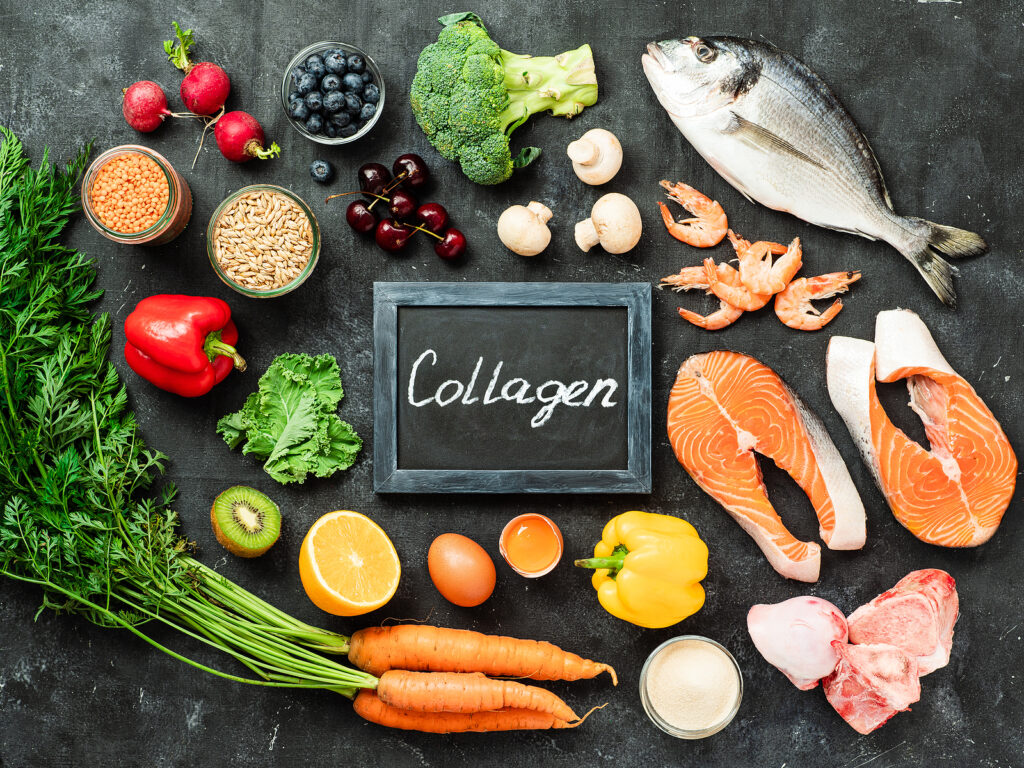
Some of the best beauty secrets are beauty secrets of the Ancient Greeks, Egyptians, and Romans.
They used honey masks, milk baths, sea salt scrubs, and oils to help slow down the signs of aging, reduce the appearance of fine lines and wrinkles, and keep their skin healthy and beautiful.
But I’m guessing that back then, they didn’t know about the beauty benefits of marine collagen.
Luckily for you, I’m about to spill the beans and tell you exactly how you can get glowing skin by adding marine collagen to your skincare routine.
But to really understand how marine collagen can help you, you need to understand some basics about the skin.
But to really understand how marine collagen can help, you need to understand some basics about the skin.
What is Collagen?
Collagen is a structural fibrous protein that exists in the human body. It’s the most important protein the body produces.
Collagen makes up about 30% of all protein in the human body and is the main protein in connective tissues (cartilage, blood vessels, and skin).
Proteins are responsible for most of the chemical reactions that occur in our cells. According to an article in Brittanica Encyclopedia, proteins also:
- Provide many structural elements of cells
- Help bind cells together into tissues
- Make movement possible because they act as contractile elements
- Transport vital materials from outside the cell (extracellular) to inside the cell (intracellular)
- Control gene activity
So, you can see that proteins play a crucial role in the human body.
But it goes even deeper.
Because proteins are made of organic compounds called amino acids. That’s why amino acids are called the building blocks of protein.
When you digest proteins, your body breaks down the proteins into individual amino acids that the body absorbs and uses to build more proteins and other molecules.
Although approximately 20,000 proteins exist in the human body and hundreds of amino acids exist in nature, only about 20-22 amino acids are necessary to make all the proteins we need.
Amino acids are divided into three groups:
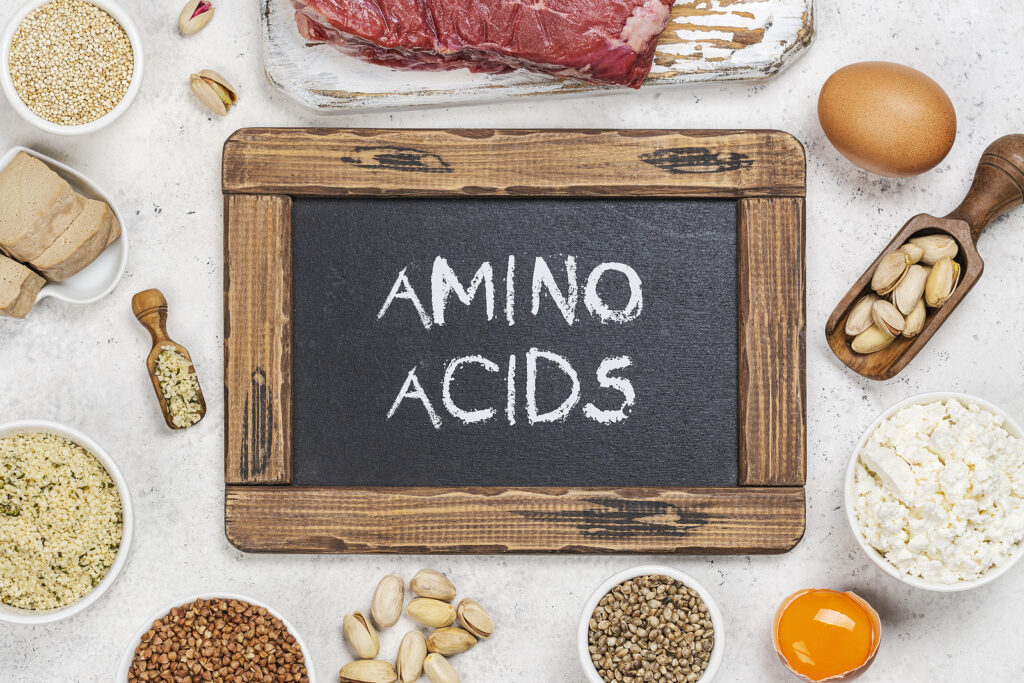
- Essential amino acids
- Nonessential amino acids
- Conditional amino acids
Essential amino acids are amino acids that are considered indispensable because your body cannot make them on its own. You have to get them from the foods you eat. There are nine essential amino acids: histidine, isoleucine, leucine, lysine, methionine, phenylalanine, threonine, tryptophan, and valine.
Nonessential amino acids are amino acids that your body can produce on its own, but that you can also get from food. There are eleven of them: alanine, arginine, asparagine, aspartic acid, cysteine, glutamic acid, glutamine, glycine, proline, serine, and tyrosine.
Conditional amino acids are amino acids that become essential during illness and stress. They include: arginine, cysteine, glutamine, tyrosine, glycine, ornithine, proline, and serine.
Your body uses amino acids to make proteins to help build muscle and repair body tissues.

But to gain a complete understanding of what collagen is, you need to understand what the extracellular matrix is because that’s where collagen lives.
The extracellular matrix (ECM) consists of tissues that exist in the body but reside outside of the cells (non-cellular). The ECM is a gel made of water, proteins and polysaccharides (complex sugar molecules).
The ECM assists cells with their mechanical characteristics and helps cells to stabilize and function. Many fibrous proteins are suspended in the ECM. And one of those fibrous proteins is collagen.
Collagen is a structural protein that acts as physical scaffolding (or mechanical strength) for the body.
In fact, the word collagen comes from the Greek word “kolla” which means “glue.” And the term “gen” means “that which produces.” Together, they mean “that which produces glue.” Or acts like glue and helps to hold your body together.
Collagen is the main structural protein in the human body and makes up approximately 30% of the body’s total proteins.
Collagen is found in connective tissue, muscles, skin, tendon, ligaments, bone, blood vessels, and in the gut. Collagen is crucial for the structure, strength, and stability of the skin.
Together, collagen and elastin (another protein fiber in the dermis) are the main parts of the extracellular matrix. They help give the skin elasticity (elastin) and firmness (collagen).
Types of Collagen

Many types of collagen exist in the body, but there are four main types.
- Type I (skin, bone, ligaments, tendon)
- Type II (cartilage and eyes)
- Type III (skin, muscle, blood vessels, reticular fibers)
- Type V (hair, lungs, bones)
Type I collagen is the most abundant form and makes up approximately 80% of human skin, followed by Type III, which makes up approximately 15%.One of the collagen’s main functions is to help the skin maintain its firmness.
According to an article in The Open Nutraceuticals Journal, collagen fibers give structural integrity to the skin and form a “dense network throughout the dermis. The main function of this network is to provide structural support to the epidermis.”
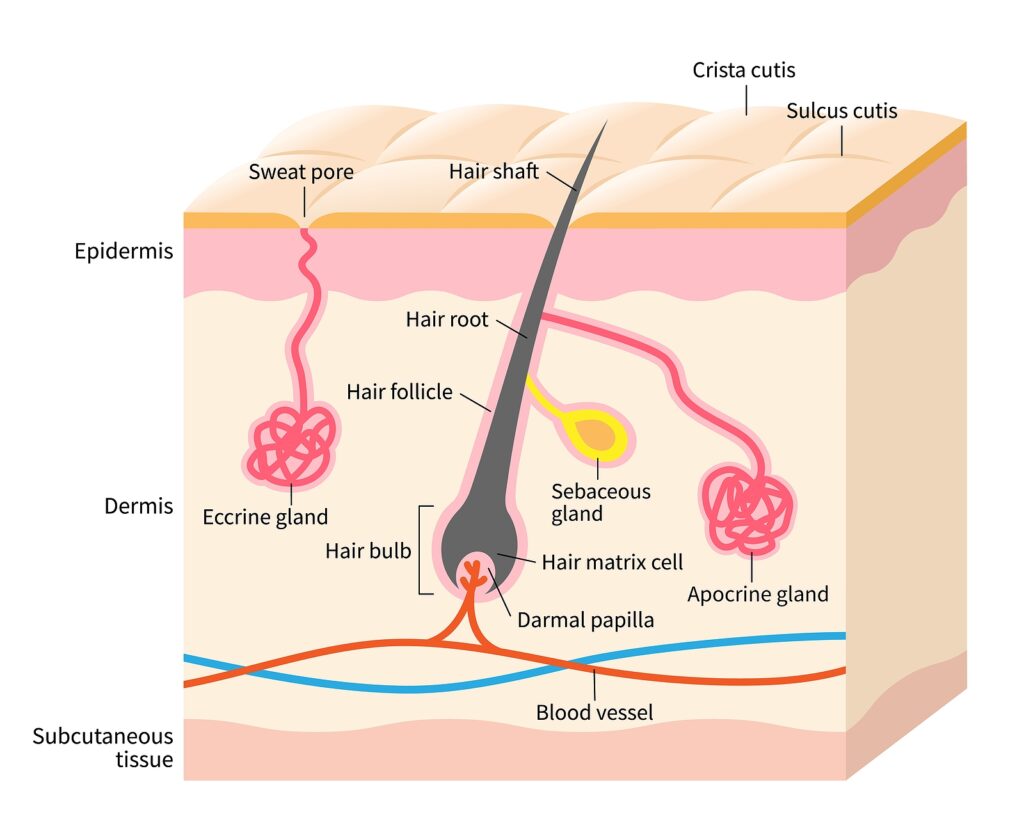
The epidermis is the thin, outermost layer of the skin. The dermis is the thick, middle layer of the skin. Collagen is located in the lower dermis, and elastin is located in the upper dermis.
Collagen is produced by connective tissue cells in the lower dermis, called fibroblasts.
As we age, fibroblasts lose their ability to produce collagen (about 1.5% reduction each year, starting in our 20s) due to intrinsic factors (e.g., aging) and extrinsic factors (e.g., sun damage).
Collagen provides structure to cells and helps tissues to resist stretching. Collagen also protects the skin because it prevents toxins and pathogens from being absorbed. Loss of collagen can cause fine lines, wrinkles, and sagging skin.
And who wants that?!!
But hold on. There’s hope.
A marine collagen supplement may help to stop those effects.
More on that later.
But first let’s dig a little deeper into exactly what marine collagen is.
What is Marine Collagen?
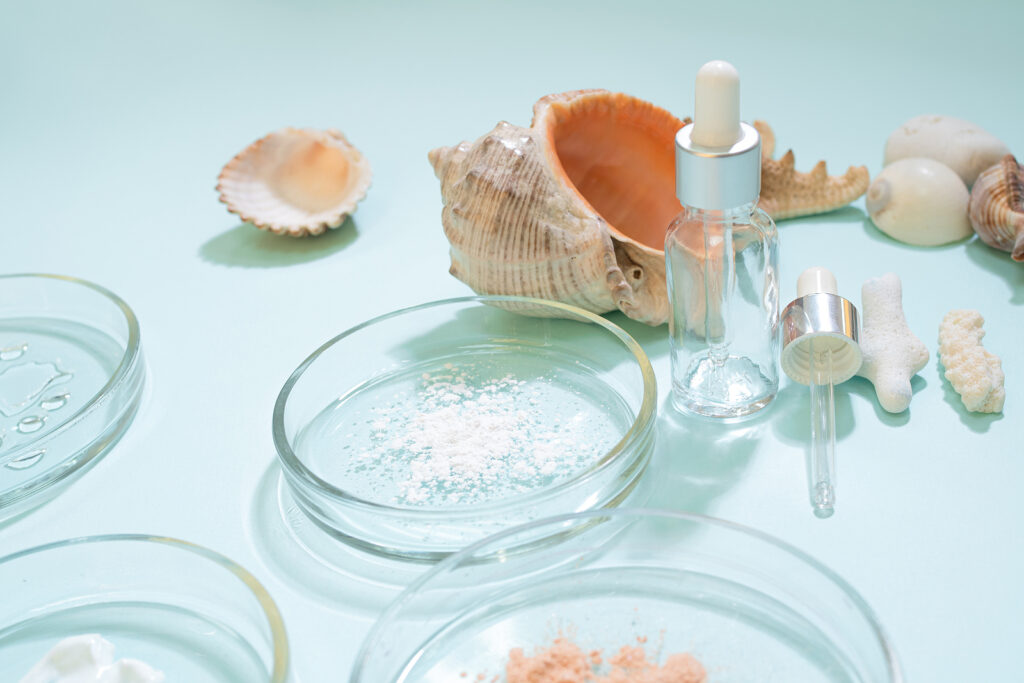
Marine collagen, also known as fish collagen, is a Type I collagen. Most manufacturers source marine collagen from the bones, scales, and skin of fish (e.g., cod or snapper).
Most of those parts are generally discarded as waste materials, so using them to make collagen helps to reduce environmental pollution.
The typical amino acid profile of marine collagen looks something like this:
- Alanine
- Arginine
- Aspartic Acid
- Glutamic Acid
- Glycine
- Histidine
- Hydroxylysine
- Hydroxyproline
- Isoleucine
- Leucine
- Methionine
- Phenylalanine
- Proline
- Serine
- Tyrosine
- Valine
The amino acids are formulated in varying amounts. In particular, marine collagen is rich in glycine, proline, and hydroxyproline. That amino acid blend is like the special sauce that gives collagen its ability to promote skin, bone, and joint health.
After collagen protein is removed from the source, it’s broken down into peptides, which are made up of amino acids, just like proteins. In fact, peptides and proteins are very similar.
The main difference between peptides and proteins is size and structure.
The amino acid chains in peptides are smaller. In general, peptides consist of 2 to 50 amino acids, and proteins consist of 50 or more amino acids. Thus, proteins are considered very large peptides.
Through a process called hydrolysis, collagen turns into peptides and is known as “hydrolyzed collagen,” which is the same thing as “collagen peptides.”
And the good thing about hydrolyzed collagen is that it functions at the level of the dermis (the middle layer of the skin) in two major ways:
First, the amino acids in hydrolyzed collagen are the building blocks that help to form collagen and elastin fibers.
Second, hydrolyzed collagen binds to receptors on the membranes of fibroblasts and stimulates the production of new collagen, elastin, and hyaluronic acid.
Now, that we’ve got the basics out of the way, let’s get into the nitty gritty of what marine collagen can do for you.
Marine Collagen FAQs

Is marine collagen safe?
According to an article published in “Oxidative Medicine and Cellular Longevity,” several clinical studies have shown that oral administration of marine collagen peptides is safe and effective.
Is marine collagen good for your skin?
You bet!
Marine collagen peptides (or hydrolyzed marine collagen) consist of low molecular weight peptides (short amino acid chains) that can be absorbed, digested, distributed, and utilized easily by the human body. This process is known as bioavailability (or available to the body).
Once the amino acids enter the bloodstream, they can be used by the body to increase the levels of collagen and inhibit the enzymes that break it down.
In a 2006 study conducted on 25 Japanese women who were experiencing dry and rough skin, the women took 5 grams of marine collagen daily for six weeks.
After the six weeks, the results showed that “the moisture content of the stratum corneum (face-cheek, forearm, and the back of the neck) increased along with improvement in the pliability and elasticity of the skin, which resulted in greater smoothness, fewer wrinkles, and less skin roughness.” (That’s what I’m talkin’ bout).
Further, several additional clinical studies on humans have confirmed that marine collagen improves skin physiology and appearance because it increases skin hydration, elasticity, firmness, and collagen density. It also improves skin texture and dermal thickness.
Finally, marine collagen has excellent antioxidant and antimicrobial properties and is proven to improve skin health and slow down the effects of facial aging.
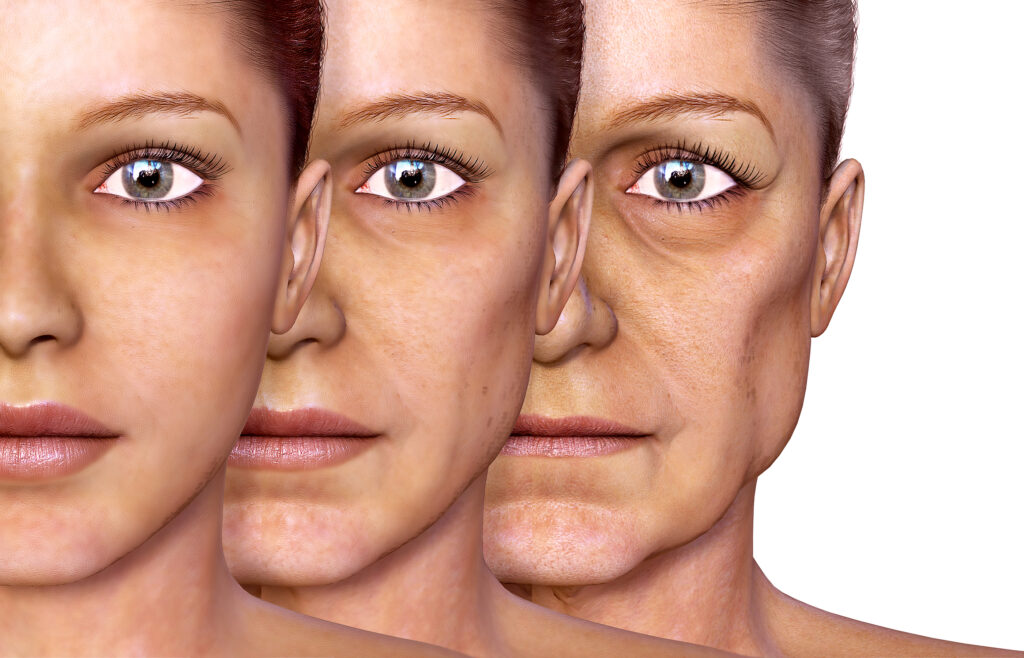
What other health benefits does marine collagen have?
Marine collagen has health benefits beyond skincare and anti-aging. Clinical studies have shown that marine collagen may help with the following:
Promotes bone healing and regeneration
In a 12-month randomized, double-blinded and placebo-controlled study of 131 women, collagen increased bone mineral density in certain parts of the body, and the study participants experienced a stimulation of bone formation. Thus, oral supplementation of marine collagen is an effective way to synthesize collagen and increase collagen quality in the body.
Heals wounds
Wound healing is a four-phase process (hemostasis, inflammation, proliferation and remodelling). Collagen plays a key role in each phase.
For example, in the proliferation phase, collagen increases the production of keratinocytes and fibroblasts and helps them to migrate to the wound site. In the remodeling phase, marine collagen peptides increase collagen production, which improves outcomes.
In short, clinical studies have shown that marine collagen peptides accelerate wound healing because they promote fibroblast production and cell movement in the wound healing process.
Helps fulfill daily protein needs
Marine collagen is jam-packed with protein. One serving of a collagen supplement can provide as much as 10 grams of protein.
Stabilizes blood sugar
In a randomized double-blind study, participants were given marine collagen peptides twice daily for 3 months. After the three months, the participants who had been taking the marine collagen peptides showed significantly reduced levels of fasting blood glucose, total cholesterol, low-density lipoprotein (LDL-the bad cholesterol), serum triglycerides, and free fatty acids.
Thus, researchers concluded that supplementing with marine collagen peptides may improve glucose and lipid metabolism, insulin sensitivity, renal function, and may help to manage hypertension.
Reduces inflammation
Studies have shown that collagen protects against cartilage loss, has anti-inflammatory effects in injured joints, and may help treat arthritic conditions.
Is marine collagen vegan?
Marine collagen is sourced from the bones, scales, and skin of fish. Therefore, it is not vegan.
How does marine collagen taste?
No fishy business here.
Marine collagen is tasteless and fairly odorless. To me, it has a mild, hard-to-describe, non-offensive smell that disappears once you add it to your food or beverage.
So, go ahead!
Sprinkle some in your coffee, tea, smoothie, yogurt, applesauce, or oatmeal, and you’ll barely know it’s there.
Marine Collagen vs. Bovine Collagen or Porcine Collagen
All collagen has health benefits.
But marine collagen has an advantage for a few reasons:
- Better bioavailability. As I mentioned, marine collagen has a low molecular weight. That means it absorbs easier and faster into the body.
- Marine collagen is a Type I collagen. Type I collagen is the main type of collagen used in the body and the main type of collagen found in skin, which makes it an ideal supplement to improve skin health.
- All collagen (bovine, marine, porcine) is made of the same amino acids. But marine collagen contains higher amounts of two key amino acids: glycine and proline. Both have been shown to promote healthy hair, skin and nails.
What Is the Best Marine Collagen Supplement?
There are many good marine collagen supplements.
But my absolute favorite is Amandean’s Marine Collagen.
Amandean stays up to date with the latest nutritional science to make sure they cultivate their marine collagen from the best and purest sources. And they test for consistency and purity to make sure they satisfy the highest quality standards for their wild-caught fish. Finally, they make sure their marine collagen is free from pesticides, chemicals and GMO practices.
Basically, I’m sold.
Everyday, I add their marine collagen to my yogurt, (along with a bunch of other yummy superfoods, like nuts and seeds). The product blends well and is tasteless. It does a body good.
Since I’ve been using it, my skin appears firmer, and my hair and nails grow faster. It took about 30 days for me to notice a difference.
Other users report that it gives them clearer skin, has improved their joint pain, and helps with post-workout recovery.
So, if you’re not allergic to fish, then I recommend adding marine collagen to your daily skincare routine because it’s an effective anti-aging product.
Conclusion
Marine collagen works.
It boosts the production of collagen, slows down UV-induced aging, and improves fibroblast proliferation.
It’s the perfect nutritional supplement to add to your daily skincare routine for an amazing glow. Your skin will be radiant and healthy. And you may even experience additional health benefits, like longer hair and nails and less joint pain.
With its powerful beauty and health benefits, marine collagen is a must-have.
Now, it’s your turn.
How do you plan to add marine collagen to your skincare routine?
Let me know below.

